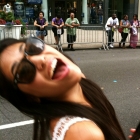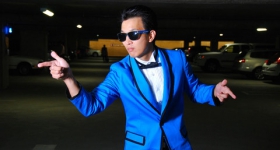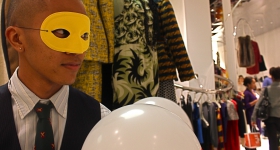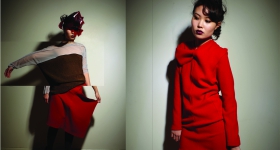Photo courtesy of wikimedia.org
You can always count on fashion to commodify and glorify the dumbest concepts: man-repelling, skinny-bitchin’, doggy-dressing, and (a new personal favorite) the “new Blackface,” aka Yellowfacing (not new at all). This time's beef is all about Dolce and Gabbana's Fall 2011 photoshoot for Vogue Nippon.
To recap briefly: last month, leading fashion site Refinery29 posted backstage hair and makeup footage of the Vogue shoot under the banner "Is taping your eyes to look Asian the new Blackface?" Styled by Anna Dello Russo, American model Crystal Renn used face tape at the temples to create "almond-shaped" eyes. Sparking a debate about Yellowfacing, the article was posted and reposted with comments ranging -- per usual when it comes to questionable Orientalism -- from complete outrage ("Idiots. Vogue is run by crazy ignorant white people"), to indifference ("People just need to stop being sensitive. There are more important things to be crying about!") At the speed of tweeting, responses quickly degenerated into two overwhelming camps: "this is racist" vs "no, it's artistic license" (with neither side missing an opportunity to call the other ignorant).
In attempts to tame some of the spiraling controversy, Jezebel's Jennifer Sauers gave Crystal Renn a chance to explain in an interview what so clearly seemed to be a matter of yellowfacing to so many. To her surprise, Sauers learned that eye-taping is a common makeup trick simply used to elongate the eyes and straighten the brow -- and that race had been a nonissue for both model and designer. For Renn, the tape was a small component of her favorite part about modeling: "the transformation."
Perhaps it was the ambiguity of what Renn meant by "transformation" or maybe it was the combination of eye-taping and a white model for Japan VOGUE, but in either case her attempt to clear the air wasn't enough and inspired Threadbared's Minh-Ha T. Pham to offer a final and critical treatment of the incident. Pulling in writers, professors and social critics bell hooks and Nirmal Puwar, Pham focused on "Fashion's depoliticization of ethnicity" and moved the controversy to a larger discussion about the white normative subject and privilege (thank goodness!).
With both sides of the debate covered however, before jumping into my own thoughts, I wanted to get some more feedback from Asian Americans actually working in the fashion industry. After a few interviews, I found more detailed versions of indifference and disgust, with opinions ranging from model Bonnie Chen noting, "I don't find this offensive, the bigger your vision is, the smaller these problems are in your mind," to Glamourbaby Diaries Ruby Veridiano-Ching contesting, "To say that shoots like these are made acceptable via creative license affirms the fact that white people are able to execute their privilege to temporarily inhabit an ethnicity without suffering the harsh repercussions of race." Others, like actor/model Justin Chu Cary, remain on the fence: "While I can appreciate the attempt, there are certainly better ways to go about acknowledging another culture's beauty."
While I received many insightful comments on the issue, I began to realize that the introduction of Crystal Renn's eye-taping debacle was framed in a powerful and maybe somewhat reductive premise by Refinery29. The general response to a question like "Is taping your eyes to look Asian the new Blackface" is to be either offended or not, outraged or not. Blackface, in popular imagination, evokes the idea of cardboard typology, and the act of violently reducing humans to caricature. Although a great conversation-starter, that question also may not leave much room for any useful dialogue to grow. Nowadays, it's any web journalist's job to cultivate space for debate; specifically speaking, the number of comments directly relates to the popularity of a blog or website. As opposed to a more nuanced understanding of cultural appropriation, and "the capacity of unmarked bodies putting on a race without bearing its burdens," this moment was undermined by reactions to reactions, offensive and not offensive.
What would the response be if Asian Americans were asked more open-ended questions, such as, "What does eye taping remind you of?" For the avant-garde (yet still commercialized) when (and of whom) does creative license require an additional sensitivity permit? And, for anyone picking up their own face-tape, instant bronzer, or dread wax, where exactly does historical context fall in the make-up aisle? These are the headlining questions I would pose instead, to start a discussion on Crystal Renn's photoshoot and racial drag. The culture today that claims to be "post-race" may be fooling itself -- but is still doing something different with race than history has ever seen. Yellowface now is being used for different ends than yellowface then. To respond effectively, we need to know much more than whether or not to be offended.
Try on the 'New Blackface' This Season in Dolce and Gabbana!
Categories:
Contributor:
- Read more about Try on the 'New Blackface' This Season in Dolce and Gabbana!
- Google+
- Forward
- Print HTML
- 3 comments
- Add new comment










Comments